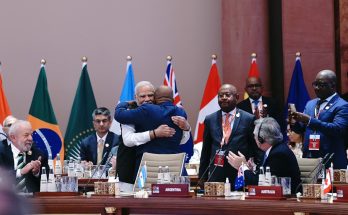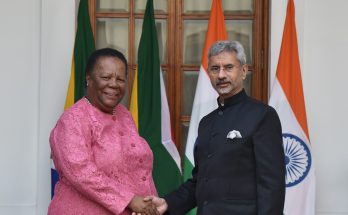A subtle but sure competition is emerging between New Delhi and Beijing in courting Africa with each of these two rising countries in Asia offering wider choices for the African nations. “Beijing Consensus” of multilateralism, “non-intervention”, “no regime change”, “win-win” was counter posed in the last decade against the dominant Washington Consensus. India, with its democratic, anti-colonial and pro-G-77 credentials, offered a middle path approach of Mumbai Consensus. These are currently at active play in Africa.
Close on the heels of the New Delhi gathering of the African nations, China is making a beeline to Africa to hold the 6th edition of Forum on China-Africa Cooperation (FOCAC) at Johannesburg.
The December 2015 meeting of the FOCAC in the commercial hub of Africa is set to be a major event. This is for the first time that the gathering is termed as a Summit meeting, elevated from the ministerial meetings before. Also, while the previous such events at Beijing (2000), Addis Ababa (2003); Beijing (2006), Sharm-el-Sheikh (2009) and Beijing (2012) were China-organised shows, the Johannesburg meeting will be co-chaired by South Africa and China.
This meeting is being held in the light of the recent events of United States Africa Command, European renewed interest, Japanese aid projects, and the recently held 3rd India-Africa Summit Meeting at New Delhi. These events suggest that Africa is finally arriving at the driver’s seat (much like the ASEAN) in steering international support for the African development.
Win-Win Cooperation?
The theme suggested by China for the 6th FOCAC is “Africa-China Progressing Together: Win-Win Cooperation for Common Development”. The host country as well as the African Union is attempting to set the agenda according to the African requirements as some of the actions of China recently became controversial. There is a pressing call on the African leaders to enter into transparent and international agreements with China mainly in the manufacturing and service sectors in order to contribute to the further development of the continent. The AU is likely to press China to observe corporate responsibility, in the light of the plunder of the resources of the continent and the recent decline in commodity prices. China’s yuan devaluation in August this year had further complicated African exports recently.
Charm Offensive
China’s President Xi Jinping is visiting the continent a second time after attending the BRICS meeting at Durban in early 2013. Premier Zhou Enlai’s African Safari in 1963-64 resulted in several African states supporting China in the United Nations successful bidding in 1971. Likewise, the May 1996 visit by President Jiang Zemin resulted in Africa opening up its commodities for the industrialisation of China. President Hu Jintao’s visit to the continent in May 2006 further cemented these ties.
China’s Premier Li Keqiang in May 2014 visit to Africa suggested “461 framework” projects (4 principles of equality, trust, tolerance and cooperation; 6 projects include industrial, financial cooperation, poverty alleviation, environmental protection, civil and cultural exchanges, peace and security; & 1 project of FOCAC platform). In addition, China’s Ambassador to South Africa, Tian Xuejun suggested “three networks” (hi-speed rail, road and aviation) to further boost connectivity between various capitals of Africa. At the Johannesburg meeting, President Xi is likely to reiterate these in addition to the recent proposal from China to invest $1 trillion in infrastructure projects abroad. This is likely to provide an opportunity for the sagging economy (the “new normal”) of China. It is not clear how much of this will be catered to Africa, but the AU needs to cautiously but proactively approach this proposal as these projects have implications for the environment, transparency of contracts and monopoly over resources and the development of local talent and technical skill transfers.
Neo-scramble for Africa
While China had become the largest trading partner for the African continent for the past six years with the 2014 figures at $220 billion (in 1956 these figures were a mere $12 million), most of this trade favoured Beijing. In comparison, India’s trade with Africa amounted to over $70 billion. With the commodity prices reducing, African economies also are facing crises. However, China’s grants, aid and other means are still meager to meet African needs– at $5 billion offered at the 1st FOCAC in 2006 and increased to $10 billion in 2014. In comparison, India’s loans to African nations amounted to $7 billion. The 6th FOCAC meeting is likely to see higher outlays in this regard. Significantly China’s aid is invariably paid by African countries through commodities. African countries then need to press Beijing to boost cooperation in manufacturing capacity and skill transfer and ensure economic efficiency.
More than half of investment in Africa comes from Europe, the United States and South Africa. From Asia, Singapore and India dominate investments in Africa. In the green field investment projects as well, Indian companies dominate the Africa scene. Beijing is a new kid on the African block in this segment. China’s direct investment in Africa was a mere $11 billion in 2006, which is projected to rise to an estimated $100 billion by 2020 as mentioned by Premier Li Keqiang.
Apart from the above political and economic forays, Beijing is exploring strategic and military engagement with Africa. Its recently unveiled Silk Road, specifically the maritime dimension, requires an estimated investment in eight new ports in Africa, in addition to hinterland connectivity. That China’s trade will be followed by its flag is confirmed by the increasing presence of its military in Africa. China’s arms sales, UN peacekeeping operations, naval port calls and training, 21 Gulf of Aden naval contingencies, evacuation of Chinese from war-torn Libya and Egypt have all contributed to this process recently.
With Djibouti poised to become China’s first overseas military base, the contest for Africa and global contest issues are emerging between the United States and China, with implications for the regional order in Africa and the Indian Ocean Region. The 6th FOCAC meeting is intended to provide a smoothening effect for China’s role in Africa, although some differences are emerging between Beijing and many capitals in Africa.
(Srikanth Kondapalli is Professor in Chinese Studies at Jawaharlal Nehru University, New Delhi. An eminent expert on China and the author of several books on India-China relations, he received the K. Subrahmanyam Award in 2010 for Excellence in Research in Strategic and Security Studies.)
-The views expressed in this article are solely those of the author)
Author Profile
Latest entries
 DiplomacyJuly 29, 2019South China Sea Imbroglio: Policy Options
DiplomacyJuly 29, 2019South China Sea Imbroglio: Policy Options China ConnectJuly 28, 2017Rising India & Rising China: A medium-term projection
China ConnectJuly 28, 2017Rising India & Rising China: A medium-term projection DiplomacyDecember 9, 2015PM Abe’s visit: Opening new vistas in India-Japan special ties
DiplomacyDecember 9, 2015PM Abe’s visit: Opening new vistas in India-Japan special ties Africa InsightsDecember 3, 2015A Tale of Two Players in Africa: Indian & Chinese responses
Africa InsightsDecember 3, 2015A Tale of Two Players in Africa: Indian & Chinese responses









